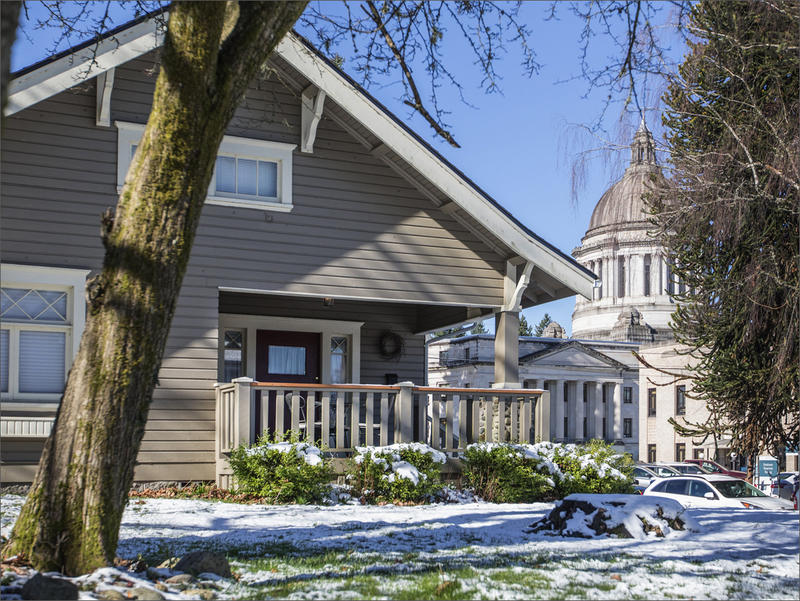
Welcome To ‘Lobbyhood’: Many Neighbors Of Washington Capitol Are Lobbyists Paid To Influence Laws
Listen
BY JOSEPH O’SULLIVAN, THE SEATTLE TIMES
A turreted brick home known as The Castle. A tan bungalow. A 111-year-old corner house with a covered porch.
Just south of the state Capitol building you’ll find a neighborhood dotted with quaint, historic houses. But you won’t find families with children in many of them.
Nearly one-third of the 62 homes found immediately south of the Capitol are owned or used by lobbyists, corporations or unions, according to a review of public records by The Seattle Times and public radio’s Northwest News Network.
Those homes, some just across the street from the Capitol campus, are a physical manifestation of the close relationship between Washington’s nearly 800 registered lobbyists and the state’s elected officials.
You could call Olympia a company town, with offices for lobbyists and government agencies spread throughout the area.
But the South Capitol neighborhood is reserved for some of the state’s most powerful influence firms. Last year, seven of Washington’s 10 highest-earning lobbying firms — most of which employ just one or a few people — had a presence in the neighborhood.
Last year, lobbyists or their firms in the South Capitol neighborhood collectively earned more than $10 million lobbying the Legislature and state agencies, according to state records.
Operating from these homes, the lobbyists advocate for or against bills moving through the Legislature. They educate lawmakers about issues — and at times help draft legislation. Some host social gatherings for legislators.
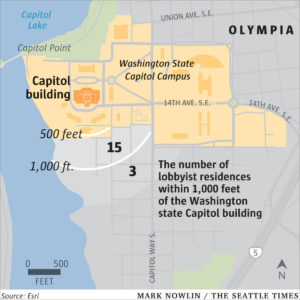
Nearly one-third of the 62 homes found immediately south of the Capitol are owned or used by lobbyists, corporations or unions, according to a review of public records. CREDIT: MARK NOWLIN/THE SEATTLE TIMES
All told, more than 240 corporations, industry associations, nonprofits, unions and local governments are represented in the neighborhood.
That includes Amazon, Google, Monsanto, Puget Sound Energy, Reynolds American Inc., Wal-Mart and Uber. Also represented are the cities of Bellevue, Seattle and Tacoma.
And then there’s Boeing, which holds a deed to its own house — that tan bungalow. The company bought it in 1997 from a lobbyist who now owns a home one block away.
That’s not unusual: Thurston County property records show lobbyists have on several occasions transferred houses to other lobbyists.
Two unions, the Public School Employees of Washington and the International Union of Operating Engineers Local 302, each own a home here, too.
Many of these lobbyists are officially registered at other addresses — often outside of Olympia. Almost none of the lobbyists have local business licenses, which the city of Olympia says are necessary — though some lobbyists have said the city has told them otherwise.
Some lobbyists say they use their Olympia homes only for sleep or light work before and after the long days of the legislative session.
With sessions in recent years lasting between two and seven months, the homes can remain vacant for long stretches in between.
“It really does leave holes in the neighborhood when a lot of the houses are sitting empty,” said Peggy Clifford, a longtime neighborhood resident.
Sen. Michael Baumgartner, R-Spokane, said the lobbyists can be helpful, especially because part-time lawmakers are generally “a mile wide and an inch deep on subject matter.”
Lobbyists are “good people and they’re smart people, but, you know, they’re not your friends,” Baumgartner said. “They’re there because they’re compensated to play a role to advocate.”
A ‘PRIME LOCATION’
To determine which houses are used by lobbyists, The Times and Northwest News Network reviewed property information through the Thurston County Assessor’s Office and then cross-referenced it with the Washington Public Disclosure Commission’s lobbyist database.
That review found 18 homes and one small apartment building in the neighborhood owned or used by lobbyists. Many of the lobbyists did not respond to multiple requests for comment.
Several of the homes are within sight of the Capitol dome and legislative buildings that lawmakers use for their offices and committee hearings.
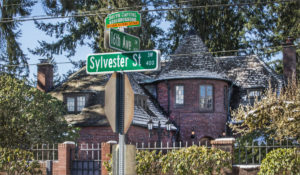
This lobbyist-owned home, known as The Castle, sits in the neighborhood immediately south of the state Capitol in Olympia. CREDIT: STEVE RINGMAN/THE SEATTLE TIMES
One of those is known as the Boeing house, which the company used even before buying it in 1997.
“The house serves as Boeing’s office in Olympia,” wrote Paul Bergman, a spokesman for Boeing, who declined to comment further.
Another house, known as The Castle, is one of two homes in the neighborhood owned by lobbyist T.K. Bentler. In 2006, Bentler was ticketed for exceeding the legal limit of parties at a private home, according to a news report at the time.
Nearby is a red-brick apartment building where several lobbyists or their firms rent space.
In an interview, Timothy Schellberg, president of Gordon Thomas Honeywell, confirmed that his firm rents space in the building.
Schellberg said his firm — which among other clients represents several cities, including Tacoma, Bellevue and SeaTac — largely doesn’t use the property to entertain lawmakers.
“They use it to eat, to sleep, to have down time,” said Schellberg.
On the first day of this past legislative session, the firm held an open house for lawmakers, Schellberg said. State records show more than two dozen legislators from both parties attended.
In an email, lobbyist Scott Hazlegrove wrote that he owned his home with another lobbyist, Bill Stauffacher, and purchased the home from other lobbyists.
When he bought the home in 2004, a lawmaker rented a room in the home, Hazlegrove wrote. That legislator stepped down in 2013, and Hazlegrove and Stauffacher haven’t since rented rooms to anyone, he wrote.
“While we have allowed friends to use the house from time to time, it is a personal residence and I spend a significant number of nights at the house while the Legislature is in session, and also during other times of the year,” Hazlegrove wrote.
At least one lobbyist, Amber Ulvenes, lives full-time in the neighborhood, which she said has helped her balance work and family responsibilities.
“I’ve been able to work and be close enough that I could even come back and nurse a baby … even in a half-hour break,” said Ulvenes, who among others represents the Midwives Association of Washington State and Kaiser Foundation Health Plan of the Northwest.
Ulvenes said she hosts a handful of fundraisers or gatherings with her clients every year, but rarely has lawmakers to her home.
One veteran lobbyist who has rented in the neighborhood for years said some of the homes are used for more informal social gatherings, such as poker or cigar nights.
That lobbyist described the neighborhood as a “prime location,” with the homes in high demand. “Good luck trying to get it back if you let it go,” said the lobbyist.
LOBBYISTS’ ROLE IN OLYMPIA
The hundreds of registered lobbyists in Olympia are known as “the third house,” behind the state House and Senate.
As lawmakers stream into town each January for the legislative session, lobbyists are there to greet them.
Rep. J.T. Wilcox, R-Yelm, said lobbyists over the years have helped bring together lawmakers from different sides of the aisle by hosting social functions.
“When you know each other and you’ve shared some stories about your families, it’s pretty hard to demonize” the other side, said Wilcox, who was recently elected minority leader for House Republicans.
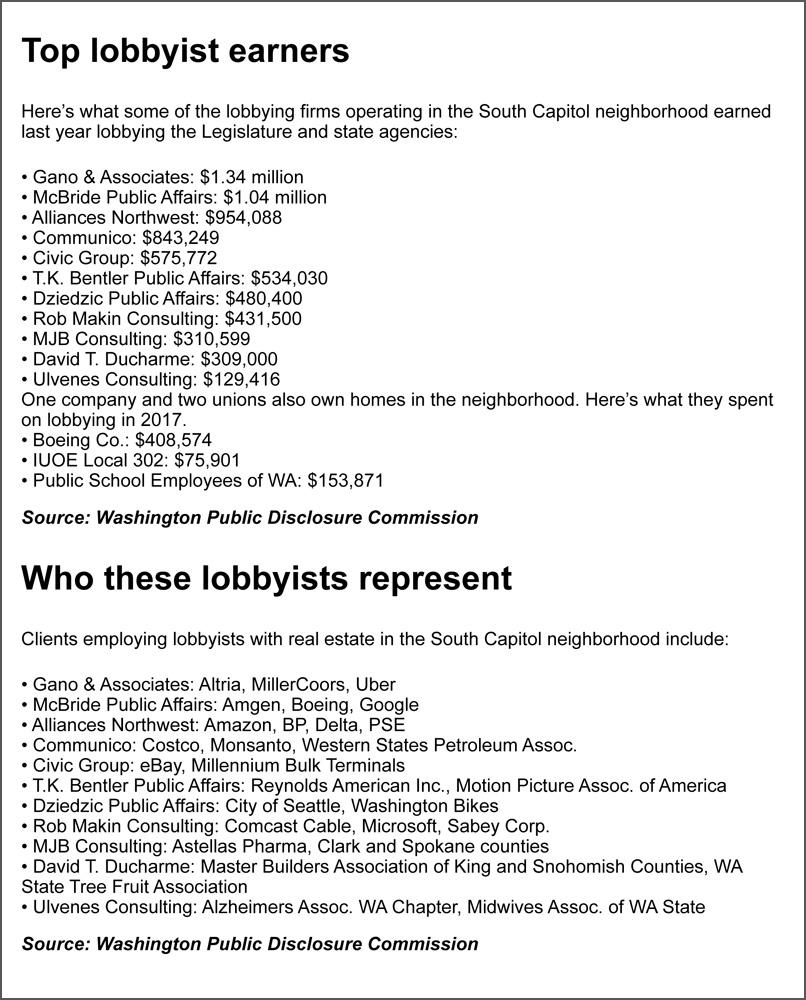
Wilcox and other lawmakers describe the events they’ve been to at lobbyist houses as largely social functions, with little actual policy discussion.
Baumgartner, the Spokane senator, described an event at one of the homes, owned by lobbyist Steve Gano and put on in March 2017 for client MillerCoors, as “not really that glamorous of a meeting.”
That event, billed as a reception, cost $604 to put on, according to state records. MillerCoors that year paid Gano and another lobbyist at his firm a combined $65,282.
Gano, who owns the 111-year-old home, was one of several lobbyists hired this year to help Cooke Aquaculture Pacific’s unsuccessful effort keep its Atlantic salmon net-pen industry open.
In 2016, Gano lobbied successfully to secure a sales-tax break for an aviation company, Gateway Aviation, to build a new maintenance facility at Boeing Field.
Wilcox said he remembered one gathering hosted by lobbyist Thomas McBride as more of business than social function.
That February 2017 technology reception was sponsored by five interests, including Google and Comp TIA. Both those organizations employ McBride, and paid his firm, McBride Public Affairs, a combined $8,000 for that month.
Democratic and Republican lawmakers attended the 2017 reception, according to state records, as well as then-state Chief Information Officer Michael Cockrill and state Chief Privacy Officer Alex Alben.
“They wanted to introduce everyone to their management, and I suppose let management see that they were on the job,” said Wilcox.
This story was produced in collaboration with The Seattle Times. Story written by Joseph O’Sullivan of the Times. Audio for radio by Austin Jenkins, Northwest News Network.
Related Stories:
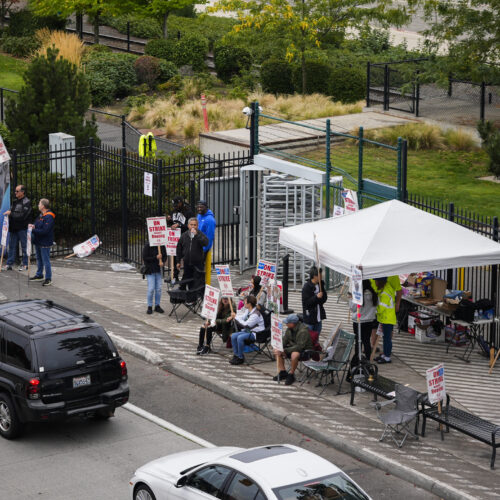
Striking workers in Washington could get access to unemployment claims if bill passes
A proposed bill that would give striking workers some access to the state’s unemployment benefits is getting closer to becoming law in Washington.
Majority lawmakers in the House Committee on Labor & Workplace Standards moved the bill out of committee on Friday, with a recommendation to pass it. This, after the bill narrowly passed the senate with 28 yeas and 21 nays earlier this month.

Wenatchee residents join statewide push for immigrant rights in Olympia
A group from Wenatchee gathered in Olympia to advocate for immigrant rights on Jan. 30. Clockwise from left, Liz Oropeza Palacios, Ivon Lopez Ramirez, Maria Gonzalez, Grace Mondragon and Zoe
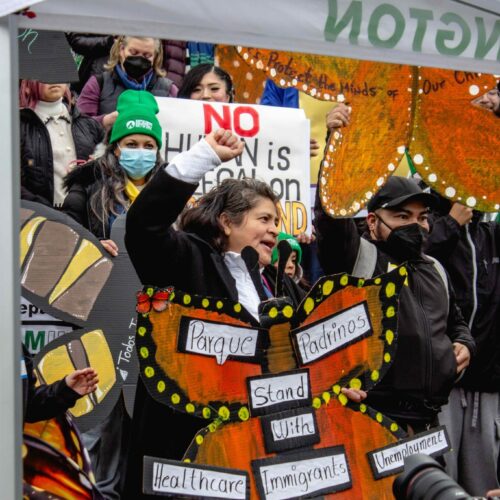
Hundreds rally in support of immigrants at Washington state Capitol
People shouted “si se puede” or “yes we can” on the Washington state Capitol steps during an immigrants’ rights rally on Thursday, Jan. 30, 2025. (Credit: Jacquelyn Jimenez Romero /















